200W TDP Testing
For our 200W TDP clock testing, we have configured our CPU to run at a fixed all-core speed of 4.8GHz on the performance cores and 3.8GHz on the efficiency cores. This yields a fairly steady 200w CPU package power draw when running Cinebench. Stock settings were set for voltage (and all other defaults), and configured memory to XMP mode.
Max Fans – 100% Pump Speed
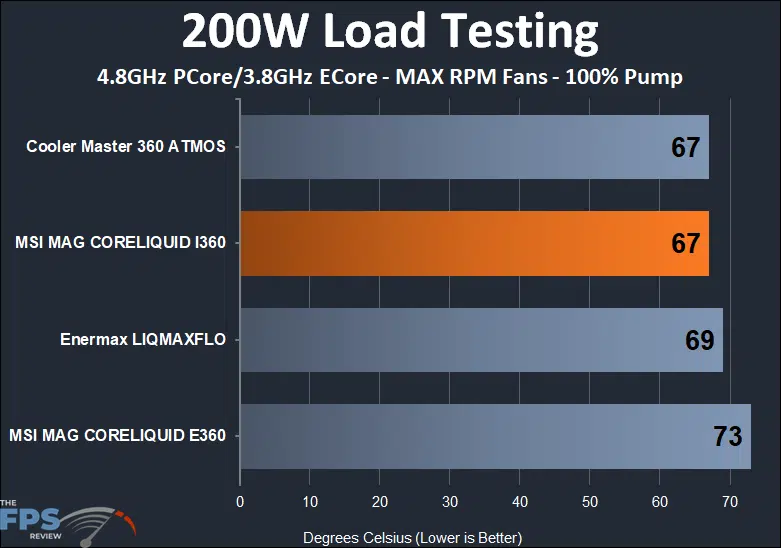
Getting the ceremonies started with fans blazing at maximum speeds, we find the MSI MAG CORELIQUID I360 cooling our rig at 67 degrees Celsius, which ties the results from the Cooler Master 360 ATMOS. The Enermax LIQMAXFLO and MSI MAG CORELIQUID E360 wind up 2 and 6 degrees Celsius warmer.
Note that at this speed, the MSI MAG CORELIQUID I360 was running at 2350RPM, the Cooler Master MASTERLIQUID 360 ATMOS at around 2500 RPM, the Enermax LIQMAXFLO 360 was running at 1900RPM and the MSI MAG CORELIQUID E360 at 1800 RPM.
1500 RPM Fans – 100% Pump Speed
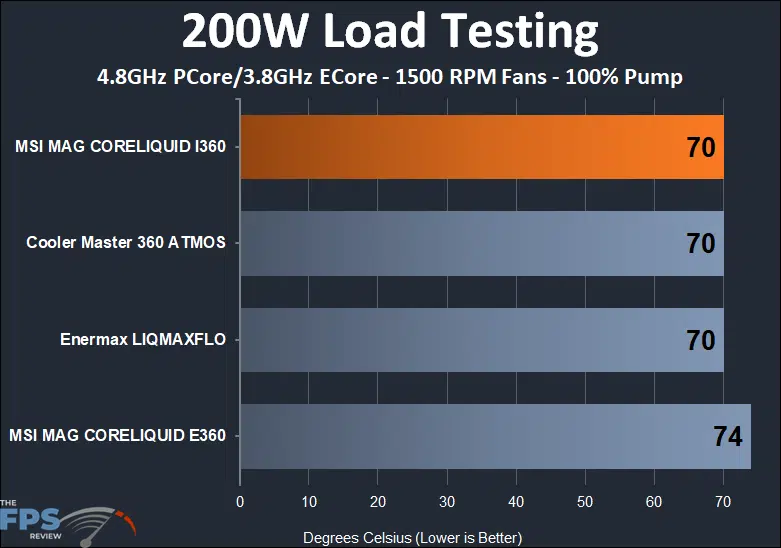
Leveling out the contestants at 1500 RPM on the fans, we find a three-way tie for the lead between the MSI MAG CORELIQUID I360, Cooler Master 360 ATMOS, and the Enermax LIQMAXFLO. The MSI MAG CORELIQUID E360 trails 4 degrees Celsius warmer.
1000 RPM Fans – 100% Pump Speed
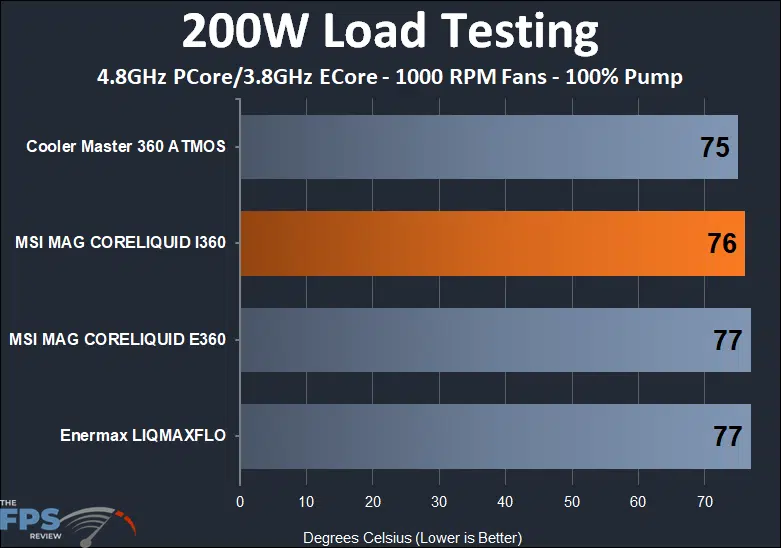
Further slowing the fans to 1000 RPM, the MSI MAG CORELIQUID I360 slips into second place at 76 degrees with the Cooler Master ATMOS beating it by a single degree. The MSI MAG CORELIQUID E360 and Enermax LIQMAXFLO are a single degree warmer than the MSI MAG CORELIQUID I360.
600 RPM Fans – 100% Pump Speed
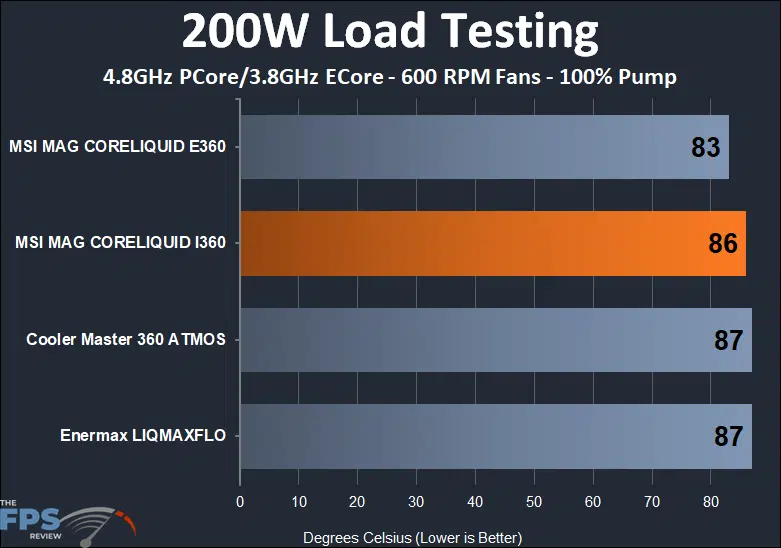
Finally, at our lowest tested fan speed of 600 RPM, the MSI MAG CORELIQUID I360 achieves an 86-degree Celsius temperature. The MSI MAG CORELIQUID E360 shoots to the top of the charts at 83 degrees while the Cooler Master 360 ATMOS and Enermax LIQMAXFLO land a degree warmer than the MSI MAG CORELIQUID I360.
250W TDP Testing
For our 250W TDP clock testing, we have configured our CPU to run at a fixed all-core speed of 5.1GHz on the performance cores and 4.0GHz on the efficiency cores. This yields a fairly steady 250w CPU package power draw when running Cinebench. Stock settings were set for voltage (and all other defaults), and configured memory to XMP mode.
Max Fans – 100% Pump Speed
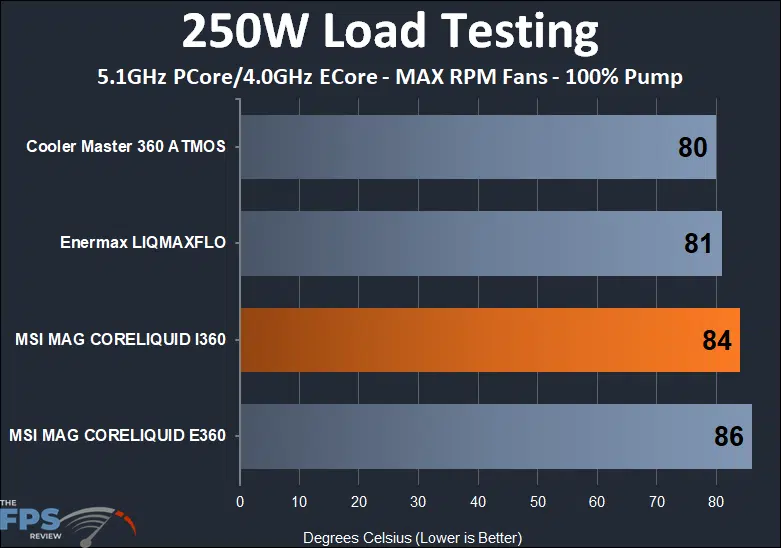
Turning up the heat to a 250W load with fans back to blazing full speed finds the MSI MAG CORELIQUID I360 turning in an 84-degree Celsius result. The Cooler Master 360 ATMOS and Enermax LIQMAXFLO bested it at 80 and 81 degrees Celsius respectively. The MSI MAG CORELIQUID E360 trails at 2 degrees warmer than the MSI MAG CORELIQUID I360.
Note that at this speed, the MSI MAG CORELIQUID I360 was running at 2350RPM, the Cooler Master MASTERLIQUID 360 ATMOS at around 2500 RPM, the Enermax LIQMAXFLO 360 was running at 1900RPM and the MSI MAG CORELIQUID E360 at 1800 RPM.
1500 RPM Fans – 100% Pump Speed
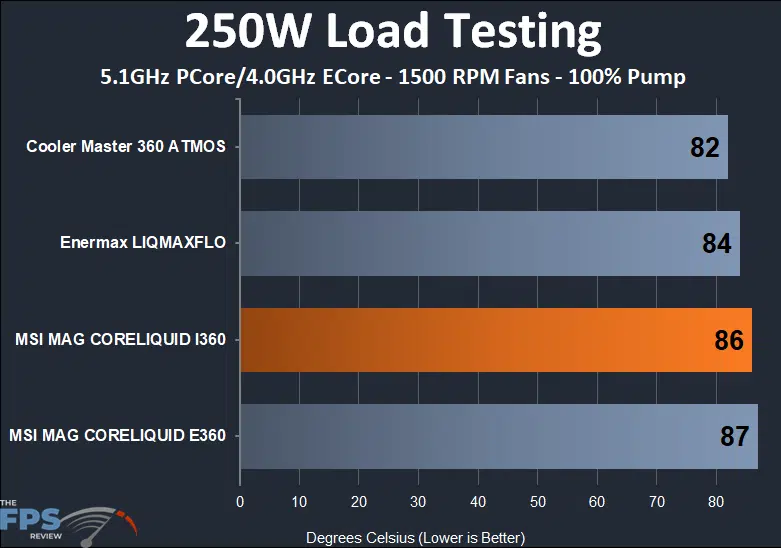
Normalizing the fans at 1500 RPM does not change the order of the contestants with the MSI MAG CORELIQUID I360 at 86 degrees Celsius. Similar to the full-speed test, it was bested by the Cooler Master 360 ATMOS and Enermax LIQMAXFLO by 4 and 2 degrees Celsius respectively.
1000 RPM Fans – 100% Pump Speed
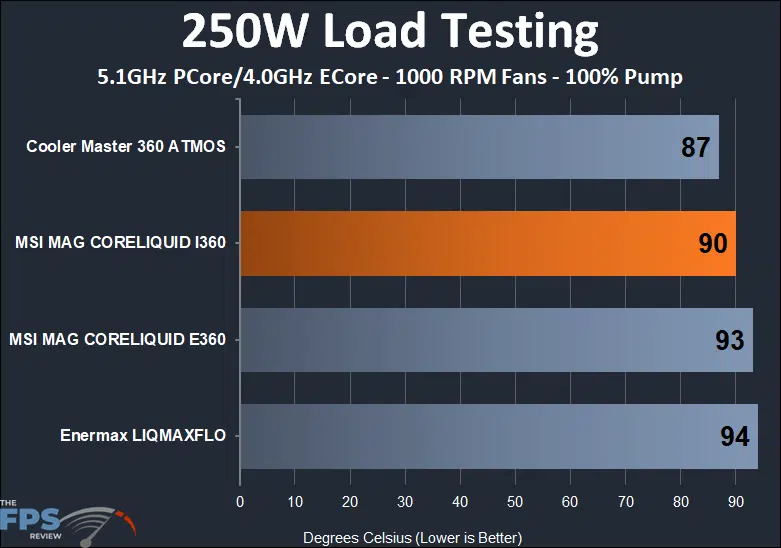
Moving down to 1000 RPM, we find the MSI MAG CORELIQUID I360 bumps up to second place with a 90-degree Celsius result. Only the Cooler Master 360 ATMOS did better at 87 degrees with the MSI MAG CORELIQUID E360 and Enermax LIQMAXFLO trailing at 93 and 94 degrees Celsius.
275W TDP Testing
For our 275W TDP clock testing, we have configured our CPU to run at a fixed all-core speed of 5.1GHz on the performance cores and 4.2GHz on the efficiency cores. This yields a fairly steady 275w CPU package power draw when running Cinebench. Stock settings were set for voltage (and all other defaults), and configured memory to XMP mode.
Max Fans – 100% Pump Speed
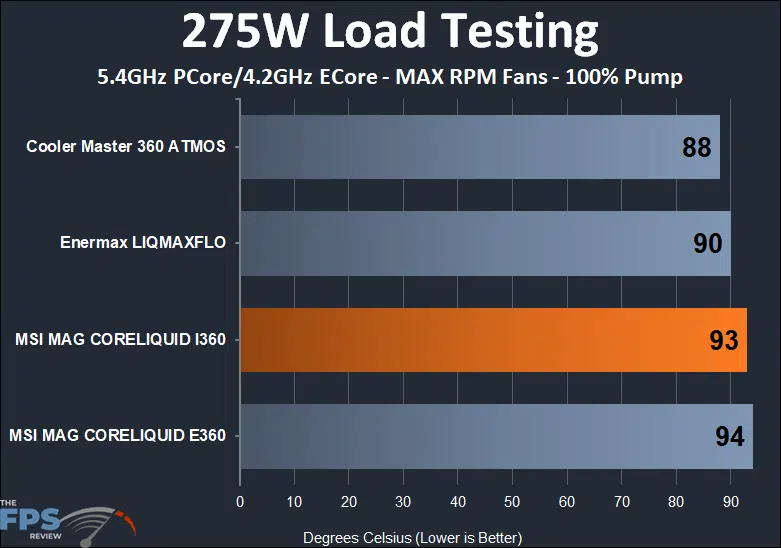
With the overclock dialed in as high as we could get it, the MSI MAG CORELIQUID I360 turned in a 93-degree Celsius result. Besting it was the Cooler Master 360 ATMOS at 88 degrees and Enermax LIQMAXFLO at 90 degrees. The MSI MAG CORELIQUID E360 brought up the rear at 94 degrees Celsius.
Note that at this speed, the MSI MAG CORELIQUID I360 was running at 2350RPM, the Cooler Master MASTERLIQUID 360 ATMOS at around 2500 RPM, the Enermax LIQMAXFLO 360 was running at 1900RPM and the MSI MAG CORELIQUID E360 at 1800 RPM.
1500 RPM Fans – 100% Pump Speed
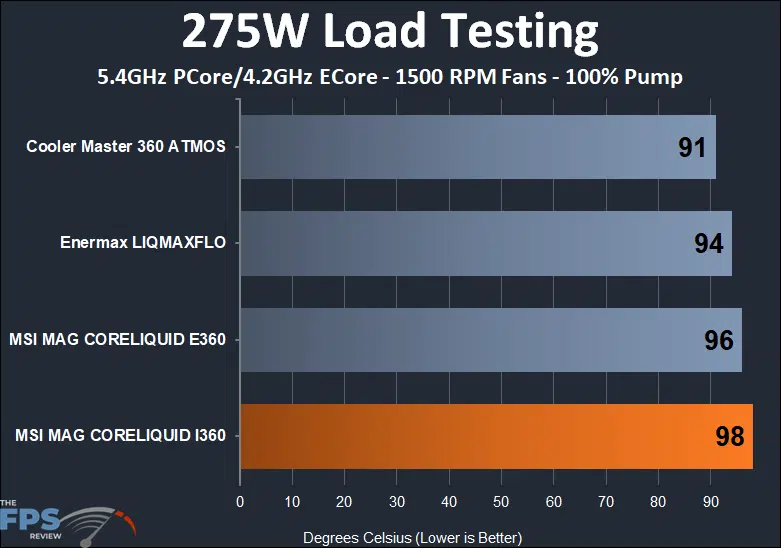
Normalizing all of the fans at 1500RPM found the MSI MAG CORELIQUID I360 dropping to the back of the pack at 98 degrees Celsius. The Cooler Master 360 ATMOS cooled to 91 degrees, the Enermax LIQMAXFLO flowed down to 94 degrees and the MSI MAG CORELIQUID E360 chilled at 96 degrees Celsius.
Now that we have seen how all of our units cool, let’s see if we can still hear!
